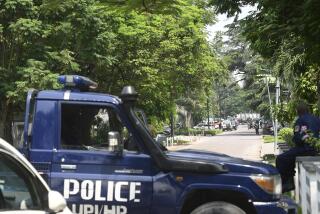Zimbabwe opposition leader will not negotiate
- Share via
HARARE, ZIMBABWE — Zimbabwean opposition leader Morgan Tsvangirai said Wednesday that he would not negotiate with the ruling party of President Robert Mugabe on a government of national unity as long as violence continues against opposition activists.
Tsvangirai also rejected participation in talks mediated by South African President Thabo Mbeki and sharply criticized the African Union for not supporting the findings of African election observers that Friday’s presidential runoff was not democratic.
The opposition Movement for Democratic Change is angry over what it sees as assurances by South Africa to African leaders that a deal on a government of national unity is imminent, when talks on the issue have not begun. It sees Mbeki, who has avoided strong criticism of Mugabe, as compromised and biased toward the longtime president, who was inaugurated to a new term Sunday after a vote tainted by Tsvangirai’s decision to withdraw because of the political violence.
Tsvangirai said nine opposition activists had been killed since the runoff, increasing the death toll from political violence to 95. About 500 people have been forced to flee their homes since the vote, he said.
“The conditions prevailing in Zimbabwe today are not conducive to negotiations,” he said at a news conference in the capital, Harare.
“If dialogue is to be initiated,” he said, “it is essential that [the ruling party] ZANU-PF stops the violence, halts the persecution of MDC leaders and supporters, releases all political prisoners, disbands the militia bases and torture camps and that the security services halt their partisan operations.”
Tsvangirai’s refusal to negotiate increases the pressure on Mugabe, who is already facing unprecedented criticism from some African leaders and threats of tougher sanctions on regime members by the United States and Europe.
At the United Nations on Wednesday, the U.S. began backroom discussions on a draft resolution that would sanction Mugabe and 11 members of his government, security forces and the Reserve Bank governor. The resolution aims to push Mugabe to begin a political dialogue with the opposition and to lift restrictions on international aid. It would freeze the officials’ overseas assets and ban travel; it also calls for an arms embargo.
The U.S. hopes for a vote within a week but will have to win support from at least nine of the Security Council’s 15 members and avoid a veto from China or Russia, which are reluctant to intervene in Zimbabwe’s affairs.
Tsvangirai argued that the AU should have taken a stronger position consistent with reports by three groups of African election observers that the vote was not democratic.
“If the African Union acknowledged these reports then we in the MDC feel that their own resolution should have been consistent with them. Unfortunately this was not the case,” Tsvangirai said.
As economic pressure mounts on Mugabe’s regime, Zimbabwe seems set for further financial chaos in coming days: A senior ZANU-PF source expects party youth militias at 900 command bases across the country to be deployed to enforce a new round of state price controls.
Last year, controls designed to halt hyperinflation led to severe shortages of basic goods, long queues and organized looting of shops and businesses by ruling party operatives. Many businesses went broke, basic goods migrated to the black market, and after several months the government was forced to abandon the policy, leading to a new increase in hyperinflation.
Inflation is now running in the millions of percent per year, according to independent economists: The exchange rate is $25 billion Zimbabwean dollars to an American dollar, compared with $15 billion a few days ago.
The German company Giesecke & Devrient, which until this week supplied about half of Zimbabwe’s currency, has stopped its exports, by order of the German government. The move is likely to cause a sudden currency shortage. It will also complicate the payment of thousands of youth militia members who have been on the frontlines of ZANU-PF’s election violence.
In an interview with the Associated Press, the U.S. ambassador in Harare, James McGee, agreed that the violence was continuing. A U.S. Embassy driver was abducted, blindfolded, held for three days without food and water and interrogated, he said.
“The violence seems to be at least at the same level [as before the June 27 vote]. We’ve heard stories, unconfirmed, of hit lists,” he said. “But we do know for a fact that people are being murdered. People continue to disappear.”
--
Times staff writer Maggie Farley at the United Nations contributed to this report.
More to Read
Sign up for Essential California
The most important California stories and recommendations in your inbox every morning.
You may occasionally receive promotional content from the Los Angeles Times.










